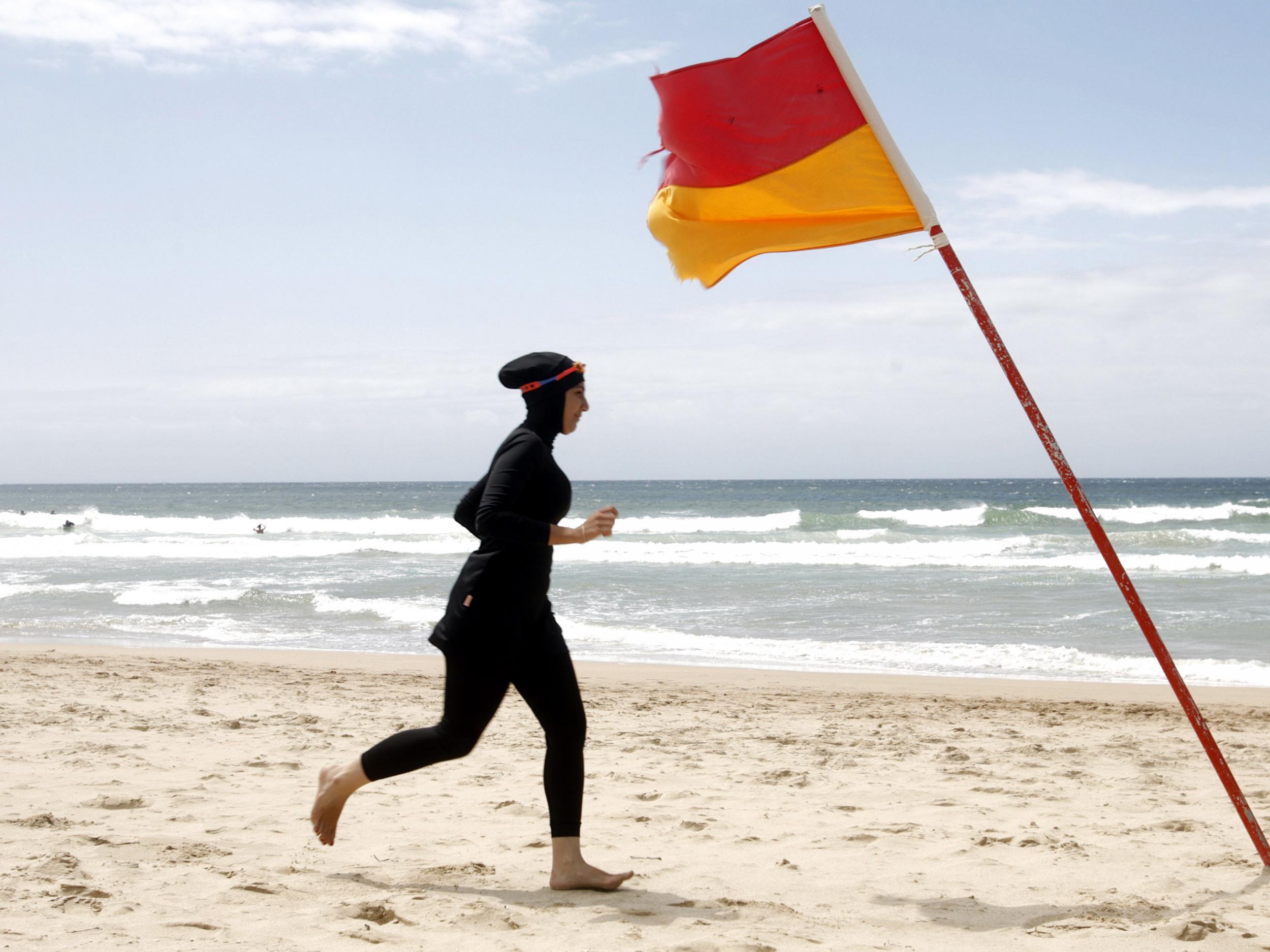Middle-aged white men like me have no right to tell women not to wear the burkini
Whether the ban on this modest swimwear is truly a contemporary expression of the French tradition of secularism, I cannot know. What I do know is that it is both wrong and counterproductive


Middle-aged white blokes making arbitrary decisions about what young Muslim women should wear at the seaside? Banning the so-called burkini? I’m not sure about that.
I know all about the French devotion to laicite and all that, but still I really cannot understand why the mayors of two French municipalities, Cannes and Villeneuve-Loubet, have gone militant about the correct attire for frolicking in the Med.
The man in Cannes, David Lisnard, says his concern is over ostentatious religious affiliation at a time of terrorism (quite a non seqitur). The other official, Lionnel Luca, cites “sanitary” reasons – which is possibly more offensive and ludicrous.
As a fellow middle-aged white bloke, I find it somewhat troubling that two of my kind reacted in this way. Whether it is truly a contemporary expression of the French tradition of secularism I cannot know. What I do know is that it is both wrong and counterproductive.
I have no problem with middle-aged white blokes making all kinds of decisions, providing two things: first, they are there on merit and they are duly elected to make them, and second, that they keep their snouts out of other people's private lives.
How much leg or midriff to display when a la plage is definitely up to the individual and nobody else. Is the wearing of a burkini really going to kick off some kind of public disturbance? No. Is it offensive? No. Is it some sort of in-your-face symbol of religious supremacy? Absolutely not.
Have we not all seen those grainy archive newsreels of Edwardian ladies taking the sea air in very burkini-like costumes? ‘Bathing beauties’, as they were once patronisingly labelled, stayed mostly covered up until the invention of the two-piece bikini in 1946.
So while the bikini – and nowadays often only the lower half of it – is well-established beachwear around the world, it is not in itself intrinsic to Western civilisation. Indeed, the emphasis on having to have a “beach-ready body”, so a skimpy bikini can be worn without supposed embarrassment, is something we ought to reflect on before celebrating the bikini as some sort of feminist triumph.
The fuss about the burkini is part of a wider debate about religious and cultural attire that has been going on for some time, with an unfair focus on Islam.
The niqab famously made the former Labour MP Jack Straw uncomfortable when he was conducting constituency surgeries. There are issues involving airport security. And when that stunning image from Rio 2016, of a German and an Egyptian woman playing beach volleyball, went round the world there was plenty of comment about some sort of cultural as well as sporting clash. Lately, we've also seen the joyous burning of the burka in liberated Syria.
I am happy to admit that when I first encountered a woman wearing a full-on burka a few years ago, I was startled. I thought about it, in the context of the debate we'd been having, and decided that, assuming it was a free choice, it was nothing to do with me, a middle-aged white bloke. In France, however, she'd have run the risk of getting arrested.
None of us should be that worried about what other people wear. Fashion is a fascinating subject, and I could laugh all day at people in Crocs, but I wouldn't pass a law about them. Regulating people's clothes, aside from official uniforms, is not a good idea. The British way is tolerance.
One of the underestimated breakthrough moments for this, decades ago, was a decision by Parliament to exempt the Sikh turban from legislation on compulsory helmets for motorcyclists. That was back in 1977. In France, you still can’t get a driving licence if your photograph has you wearing a turban, and nor can a child wear a turban in school.
On the whole, the British approach is based on multiculturalism with the hope (well, my hope) that integration or assimilation can follow by choice and consent. If not, people are allowed their own ways and their own habits. In practice there's a spectrum, with lots of people in the middle of the road, partially religiously observant, following some traditions not others, more or less comfortable with a British identity; it’s up to them.
That is a messy, pragmatic path and it throws up lots of anomalies that the courts, families, businesses and politicians have to deal with, such as the British Airways stewardess, a Christian who wanted to display her crucifix at work. That sometimes provokes a big public debate – often heated – and then we muddle though. We do not, as they do in France, pass laws prohibiting Jewish children from wearing skullcaps in state schools nor, indeed, fine women £30 for wearing a swimsuit of their choice.
The French tradition is difficult for us to comprehend. Their pejorative word for what they fear, communautarisme, doesn't translate well into English, but it equates to promotion of separate cultures. The British call it multiculturalism, and usually celebrate it, and there lies a difference.
Sorry to be so chauvinist, but it is worth comparing the French and British cultures in this area because our countries share so many values and remain friends and partners, and yet the difference between us on this matter is so very stark. Maybe we have something to learn from each other – but I would not like to see a ban on the burkini at Brighton, Skegness or Southport.



Join our commenting forum
Join thought-provoking conversations, follow other Independent readers and see their replies